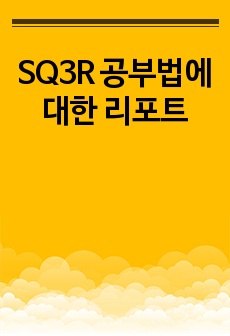What is `Military-First Politics`?
*옥*
다운로드
소개글
This article is designed to define North Korea`s ‘Military-First Politics’ as the main ruling ideology of the Kim Jong Il regime and aims to research its ideological features. This article also tries to analyze the roles and functions of the Korean People`s Army(KPA) under the Kim regime`s military-oriented political system.목차
없음본문내용
What is `Military-First Politics` ?A Study on the Ruling Ideology of the Kim Jong Il Regime
선군정치란 무엇인가 -김정일 통치이데올로기 연구(영문)
The Graduate School of Politics & Policy
Kyonggi University, Seoul, Korea
The concept of `Military-First Politics` has become a critical subject to understand Kim Jong Il`s North Korea. A key word that can characterize North Korea under the Kim Jong Il regime is most likely `Songun Chongchi`, translated into Military-First Politics in English. If one were allowed to add another key word, the best candidate would be `Gangsong Daeguk`(powerful and prosperous nation). These two ideas are, more or less, closely intertwined, for Military-First Politics is touted as the key instrument for building a powerful and prosperous nation.
`Songun` is a familiar term in today`s North Korean propagandistic media, as is the fact that the North Korean society is highly militarized. In the joint New Year`s Day editorial of 2006 the term Songun is mentioned as frequent as 42 times, a number that outbeats any other word in the editorial. It is also noteworthy to recognize that in most cases, the term is used as an adjective rather than a noun ― such as Military-First Politics, Military-First Ideology, Military-First Principle, Military-First Doctrine, Military-First Theory, Military-First Era, Military-First Leadership, Military-First Revolutionary Line, Military-First Revolutionary University, Military-First Korea and even Military-First Hairstyle.
The term `Gangsong Daeguk` was introduced into the North Korean society in January 1999. The joint New Year`s Day editorial of that year was entitled
참고 자료
Barany, Zoltan, Soldiers and Politics in Eastern Europe, 1945-90, New York: St. Martin`s Press, 1993.Bernstein, Eduard, The Crisis of Marxism(편집및 서문 김수행), 도서출판 새날, 1990.
Cohen, G. A., Karl Marx`s Theory of History, Princeton, 1980.
Cornell, Erik, North Korea under Communism, Routhedge/Curzon, 1st edition, 2002.
Cumings, Bruce, The Origines of the Korean War: Liberation and the Emergence of Separate Regimes 1945-1947, Princeton: Princeton Press,1981.
Cumings, Bruce, The Origines of the Korean War: Vol.Ⅱ: The Roaring of the Cataract 1947-1950, Princeton: Princeton Press, 1990.
Cumings, Bruce, Korea`s Place in the Sun: A Modern History, W.W. Norton and Co., 1998.
Cumings, Bruce, North Korea: another country, New York: New Press, 2004.
Cumings, Bruce, Abrahamian, Ervand, and Ma`oz Moshe, Inventing the Axis of Evil: The Truth About North Korea, Iran and Syria, New York: New Press, 2004.
Engels, F., Anti-Duhring, Peking: Foreign Language Press, 1976.
Eberstadt, Nicholas. The End of North Korea, Washington D.C.: The AEI Press, 1999
Etzioni, Amitai, The Active Society: A Theory of Societal and Political Process, New York, Free Press, 1968.
Finer, S. E., The Man on Horseback: The Role of the Military in Politics, New York: Frederic A. Prager, Inc., 1962.Friedrich, Carl J. and Zbigniew K. Brzezinski, Totalitarian Dictatorship and Autocracy, (revised by C.J. Friedrich), Cambridge Mass.: Harvard University Press, 1965.
Giddens, Anthony. The Nation-State and Violence, Cambridge: Cambridge University Press, 1986.
Harrison, Selig S., Korean Endgame: A strategy for Reunification and U.S. Disengagement, Princeton and Oxford: Princeton University Press, 2002.
Kim, Jong Il, Our Socialism Centered on the Masses Shall Not Perish, University Press of Pacific, 2003.
Kim, Samuel S., The North Korean System in the Post-Cold War Era, Palgrave Macmillan, 2001.
Kim, Suk Hi, North Korea at Crossroads, McFarland & Company, 2003.
Koestler-Grack, Rachel A., Kim Il Sung and Kim Jong Il(Major World Leaders), Chelsea House Publications, 2003.
Kong, Dan Oh, et al, North Korea through the Looking Glass, Brookings Institution Press, 2000.
Kornai, Janos, The Socialist System: The Political Economy of Communism. Princeton University Press, 1992.
Lankov, Andrei, From Stalin to Kim Il Sung: The Formation of North Korea 1945-1960, Rutgers University Press, 2002.
Lezek Kolakowski, et al, Main Currents of Marxism: The Founder, The Golden Age, The Breakdown, W.W. Norton & Company, 2005.
Lenin, V. I., Introduction to Marx, Engels, Marxism, 서울: 국제서적편집부, 1990.
Lenin, V. I., The State and Revolution, Penguin Books, 1992.
Marx, Karl, (abridged) Das Kapital, Gateway, 1967.
Marx, Karl, Misere de la philosophie, Paris: Editions Sociales, 1947.
Mazman, Ibrahim, Max Weber`s ideal types of patrimonialism, sultanism, and bureaucracy: An assessment of their accuracy and utility in the case of rulership relationships in the Ottoman Empire, Michigan: ProQuest/UMI, 2006.
McCormack, Gavan, Target North Korea: Pushing North Korea to the Brink of Nuclear Catastrophe, Nation Books, 2004.
Mclellan, David, Karl Marx; His Life and Thought, Harper & Row, 1973.
Natsios, Andrew S., The Great North Korean Famine, Institute of Peace Press, 2002.
Noland, Marcus, Korea after Kim Jong-IL, Institute for International Economics, 2003.
Oberdorfer, Don, The Two Koreas : A Contemporary History, Washington, Basic Books, 2001.
Perlmutter, Amos and Bennett, Valerie Plave, The Political Influence of the Military, New Haven and London: Yale University Press, 1980.
Quinones, Dr. C. Kenneth and Tragert Joseph, The Complete Idiot`s Guide to Understanding North Korea, Alpha Books, Reissue edition, 2004.
Righetti, Nicolas, The Last Paradise: North Korea, Umbrage Editions, 2003.
Schurman, Franz, Ideology and Organization in Communist China, Berkeley: University of California Press, 1968
Stalin, Joseph V., Problems of Leninism, Joseph V. Stalin Selected Works, Davis, Calif.: Cardinal Publishers, 1971.
Trotsky, Leon, The Revolution Betrayed - What is the Soviet Union and
Where is it going?, Pathfinder, 1989.
Trotsky, Leon, In Defense of Marxism, Pathfinder, 1995.
Vollertsen, Norbert, Inside North Korea: Diary of a Mad Place, Encounter Books, 2004.
이 자료와 함께 구매한 자료
 ak에서 배우는 경영의 지혜 2페이지
ak에서 배우는 경영의 지혜 2페이지 북한군 통수체제와 당-군 관계 10페이지
북한군 통수체제와 당-군 관계 10페이지 북한이 말하는 평화 5페이지
북한이 말하는 평화 5페이지 [선군정치]선군정치란 무엇인가 (선군정치 문답풀이) 56페이지
[선군정치]선군정치란 무엇인가 (선군정치 문답풀이) 56페이지 공산당선언 발표 160주년...마르크스의 유령은 환생하는가 28페이지
공산당선언 발표 160주년...마르크스의 유령은 환생하는가 28페이지




























